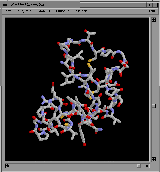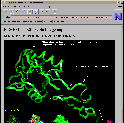This article first appeared in The Independent 1st.May
1995, and is reproduced here with their explicit permission. Please
respect their copyright.
Who wants to go to a virtual university?
Open learning on the Internet is now a fact says Helen
Jonstone. But what about the quality?
In a few weeks, the class of '95 will graduate from Birkbeck
College in London's first virtual university course. When term ends in late May,
around 80 "graduates" will emerge from the online study rooms and
libraries, clutching virtual diplomas in the Principles of Protein Structure.
The diplomas will not be officially recognised, for this year's
students at least, but that does not detract from the importance of the
PPS course. It is one of the first courses in the world to be
tailored to, and taught via, the Internet.
Education has long been considered an area that can benefit from online
systems - but activity, at least in the tertiary sector, is only now
starting to pick up pace.
In the US, home of the Net, distance learning still relies on
television technology. Only the Australians, who need to reach
students in the outback, have an edge on Britain. At Monash
University in Clayton, Victoria, all computer science courses can be
taken via the Net. The university has been running online courses
since 1980 and has seen hundreds of students graduate.
Last year Southampton University began allowing students in Information
Engineering to receive course material by e-mail, while the Open
University offers two computer courses via the Internet to non-European
students.
Last summer, the OU ran its first virtual summer school,
connecting 12 students who were unable to attend the regular summer
school to a remote tutor via video-conferencing and e-mail links.
But the OU, which would seem to be the obvious institution to exploit
the new technology, has yet to embrace it Whole-heartedly. Its
students within Europe are still expected to use the phone, fax and
local meetings.
Nevertheless, interest is growing rapidly worldwide, which is why a
voluntary body, with its headquarters in Texas, has been established to
help administer online courses and conduct research. As well as
producing an online prospectus of its courses, the Globewide Network
Academy provides expertise and resources to many of the new
courses.
The GNA's Virtual School of Natural Science, is a co-sponsor of the
course and one of its voluntary professors, Peter Murray-Rust, is also
one of the principal architects. As a visiting professor to the
Birkbeck crystallography department, he has been working on it with one
of the College's fellows, Alan Mills. They have put the PPS course
at the forefront of online education, with a course that makes the Net
an integral part of every aspect of academic life from student
registration to end-of-term party.
 Registration for the course is by email, with students filling in an
electronic form held on a World Wide Web page. Course material is
provided on a series
of Web pages, with "hypertext" links from those
pages to other relevant resources on the Net. That means students can
click on highlighted words and jump to linked pages.
Registration for the course is by email, with students filling in an
electronic form held on a World Wide Web page. Course material is
provided on a series
of Web pages, with "hypertext" links from those
pages to other relevant resources on the Net. That means students can
click on highlighted words and jump to linked pages.
To discuss the course, identify problems and keep in touch with
other students, the PPS has a number of e-mail mailing lists. For
"tutorials" or for socialising - at the end of term
party for instance - students visit a specially designated multi-user dungeon called
the BioMOO. There they can "chat" to other students and the course
"lecturers", or consultants. Few of them are likely to meet face to
face during the course.
"It was something who's time had come," says Prof Peter Murray-Rust.
With around 30 million people able to access the Internet and cheap
software available for browsing the Web, 1995 seemed like the perfect
time to launch the course - free - to the world.
More than 250 students and consultants signed up from as far apart as
China and Croatia. The list of consultants is a who's who of
the protein world, bringing the top experts together from around the
world to offer advice and expertise via the Net. The course has
also been given access to some impressive resources, including
specialist databases at the Brookhaven National Laboratory in New York.
"The collaboration, in an international arena, is the thing that gives
me the most satisfaction," says Murray-Rust. "It's one more thing
that's shrinking the world."
The course is no soft option for students, who are expected to complete
a series of assignments and projects. At the start of the course,
Alan Mills split the 250 students and consultants into study groups.
"We created 20 groups of 12 - 15 people and named them after the 20
natural amino acids," he says. "We then randomly allocated each of them
one particular protein from the Protein Databank." The students were
then told to find out what they could about their allocated proteins
and publish the results on the PPS Web pages for other students to
use.
With no formal classes, lectures or tutorials, the PPS has an air of
anarchy. There is no obvious differences between students and
consultants, who can both produce material and criticise work on the
course. "The distinction between students and consultants has been
blurred - deliberately," says Dr.Mills.
For the consultants, the electronic campus has also given them a
certain instant academic recognition. They have a global audience and a
place to publish their work which avoids the time-consuming process of
submitting it to an academic journal. "With the Internet, you can
publish something and have it there with no modification," says Glenn
Proctor, a second year graduate student at York University and one of
the course consultants.
 Proctor is also making good contacts in his field : "I'm doing research
in a small area of protein structure. I've met a lot of people I
wouldn't have known about if I hadn't done the course."
Proctor is also making good contacts in his field : "I'm doing research
in a small area of protein structure. I've met a lot of people I
wouldn't have known about if I hadn't done the course."
More than a half of those on the course, however, are likely to drop
out before the end. The course inevitably attracted a number of
students intrigued by the idea of virtual study but with little
commitment to a course that asked for real study but could not offer a
real qualifaction.
Only a Certificate of Participation will be available for this year's
graduates, but Dr.Mills and Professor Murray-Rust hope to have
accreditation for
the course in time for next year's intake. To gain that, they have to
establish ways of verifying the identity of those on the course and of
supervising exams. Someone will have to be assigned responsibility for
ensuring the course material is kept up to standard and administration
procedures will have to be put in place. And they will have to charge
fees for the course, which is currently free.
The speed at which online courses, like the Birkbeck's are becoming
established has begun to raise questions among both teachers' and
students' bodies. The National Association of Teachers in Further and
Higher Education, the National Union of Teachers and the National Union
of Students have put together a team to look at the potential dangers
of an increasingly electronic education system.
"All of us have recognised there are a lot of opportunities and
benefits to be gained," said an NUS spokesperson. "But we've got to
make sure this isn't a method of increasing numbers in higher education
on the cheap."
Dr.Mills says Birkbeck has been careful to keep the standard of its
course material high. "This is not a Mickey Mouse course. Very few real
life institutions have the resources to mirror ours."
The NUS is also worried that online learning will be of most benefit to
those with the technical skills and the access to the technology, who
tend to be young, male and relatively well-off. Dr.Mills admits women
only account for around 15- 20 per cent of course participants, but
says that a every effort is being made to help those who struggle with
the technology.
Nina Krauzewitz, a post doctoral student studying viral oncogenes at
the Royal Postgraduate Medical School and a PPS student, says she was
initially uncomfortable about using the technology : "I was terrified
of the idea it was going to be done over the Internet." Instead she has
found herself enjoying it. "What it's really done for me is to open up
a whole new area for me to explore and get information from."
Online learning is now offering students the potential to pick
and choose the course they want from almost anywhere in the world.
Professor Murray-Rust believes the student of the future will chose the course he
or she wants from the quality of resources and consultants it can bring
together. "You'll see education as a market place," he says.
"Reputation will dissuade people from taking up poor courses."
But will the virtual university ever replace the real thing? "We
wouldn't want it to," says Dr.Mills. "The key thing is contact with
teachers and mentors, and the sense of community."
"I certainly hope our
children will go to a real life university," adds Professor Murray-Rust.
Birkbeck College PPS course:
http://www.cryst.bbk.ac.uk/PPS/index.html
Globewide Network Academy:
http://uu-gna.mit.edu:8001/uu-gna/index.html
Open University:
http://www.open.ac.uk/OU/CourseDetails/thd204.html
Southampton Institute MBA:
http://www.cecomm.co.uk/
Monash University:
http://www.monash.edu.au/
Home Page
 Registration for the course is by email, with students filling in an
electronic form held on a World Wide Web page. Course material is
provided on a series
of Web pages, with "hypertext" links from those
pages to other relevant resources on the Net. That means students can
click on highlighted words and jump to linked pages.
Registration for the course is by email, with students filling in an
electronic form held on a World Wide Web page. Course material is
provided on a series
of Web pages, with "hypertext" links from those
pages to other relevant resources on the Net. That means students can
click on highlighted words and jump to linked pages.
